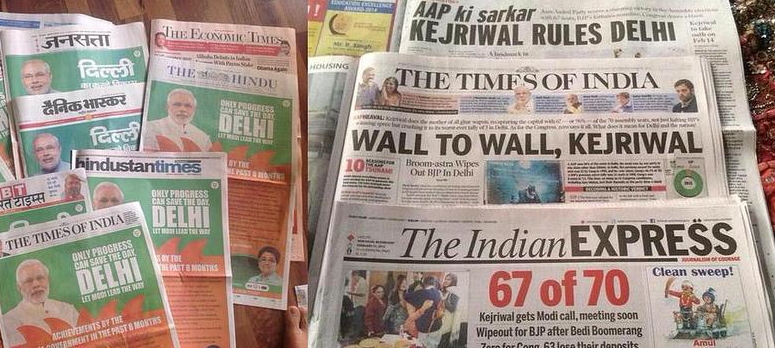The Delhi election result symbolizes the power of our democratic system. Come 14th of February 67 common men will be sitting in the Delhi Legislative Assembly as law makers. The exceptional victory carved out by the resilient Aam Aadmi party led by Arvind Kejriwal has perplexed the entire political arena. The shock and awe generated by this triumphant conquest of Delhi will be hard to swallow for the BJP as well as other mainstream political parties.
Valiant, courageous and bold are few of the many compliments with which one may describe the AAP campaign. Sticking to the old and tested method of connecting with the grassroots, the party initiated a cleverly chalked out door to door campaign. It did not mind the drudgery of interacting with millions on a personal basis, thereby giving it a considerable edge over its rivals. The idea of a government led by individuals as common as the citizens on the streets resonated amongst the masses. The public massively rallied behind AAP and decimated all others staking claim to power in Delhi.
The annihilation of mainstream political parties particularly the BJP (Congress no longer seems to be a force to reckon with anywhere in the country) reinforces the premise that elections in India are totally unpredictable. While the wave this time around was certainly in AAP’s favor one did not expect the saffron party to suzerain its self respect to the former. To sweep the problem under the carpet one may attribute the defeat suffered by the party to a variety of factors ranging from Kiran Bedi to a combination of over confidence and arrogance. However there is a fundamental flaw in the strategy adopted by the BJP in successive elections. The party proficiently camouflaged its faults while surfing the Modi wave through continuous elections in Maharashtra, Haryana, Jharkhand and Jammu and Kashmir. With the Modi mania suffering from diminishing marginal utility, the party needs to revamp its election tactics.
Traditionally the BJP has been a cadre oriented organization supplemented and influenced by various other political and social groups like RSS. Never has the party previously depended on the personality of one individual leader to forge successful political fortunes. In every election the party slogan has always been centered on Modi. Though this plan has worked in previous elections, the failure in the present political battle shows its vulnerability in the long run. Projecting the Prime Minister at the forefront of every BJP controlled state government runs the risk of exposing him as being solely responsible for the debacles of the state governments. This strategy will not only impair the indomitable Modi image, it may also injure the ability of the party cadre to independently assess and formulate the approach needed to win electoral battles locally as they will be excessively relying on the Modi icon.
In campaigning for the general elections over 9 months back the BJP held on to the promise of development, growth , employment and modernization with the use of science and technology. Speeches made by Mr Modi and their leaders gave the impression that the party held a copyright over these issues, with no other political outfit being able to match their vision. The positive agenda set by the party previously is now being replaced by vicious and vitriolic dialogue against certain sections of the society. Fringe elements within the BJP are gaining ground at a leisurely pace and their medieval influence is slowly creeping into the party vision. Statements made by obstinate members of the party like Sakshi Maharaj have impaired the party’s progressive outline. If they continue to occupy additional space within the party hierarchy the likelihood of disillusionment against the party is bound to increase. During the Delhi campaign the party made a last minute gambit to play the religious card by targeting AAP over the statement made by the Shahi Imam of the Jama Masjid in the latter’s favor. The ploy failed miserably and should serve as a lesson. In the future it is essential that the BJP stick to the appealing slogan Sabka Saath Sabka Vikaas instead of hoodwinking the electorate by playing the divisive card.
Though the present verdict meted out by Delhi is in no way a referendum on the BJP led central government, it must serve as an eye opener to party tacticians. They took the people for granted and suffered ignominiously. It has been the party objective to expand nationally and for that to happen it is imperative for the party to hand over the reins of electioneering back to the cadres and marginalize pigheaded leaders derailing the optimistic approach with which the party won the hearts of millions.
Rohan Shridhar is a law graduate and legal activist from the state of Himachal Pradesh




